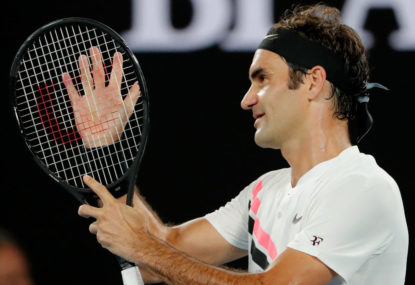Demon slays the King: de Minaur savours 'once in a lifetime' moment after knocking off Nadal on clay
Rafael Nadal has hailed the brilliance of Alex de Minaur, calling him "a great player" after the Australian forced the Spanish legend to say…

Sport plays a very significant role in world society and culture, especially in Australian society and culture. Whether it should play such a significant role is debatable.
Arguably sport provides a useful and more socially acceptable outlet for aggression and competitiveness for participants and is supposed to offer participants the opportunity for development of physical and psychological qualities and that can be beneficial for the more important things in life.
It is certainly open to question as to whether it is reasonable that many elite participants in sport are paid obscene amounts of money for moving fast in various ways; kicking, hitting or throwing balls with great skill; or performing other sporting skills with excellence, while countless millions starve and, for example, teachers and health workers struggle to make ends meet in many countries.
Sport arguably also provides spectators with a more socially acceptable outlet for aggression, competitiveness and tribalism and in general terms functions as the ‘opiate of the masses’, replacing religion in this role as originally suggested by Karl Marx.
I do not propose to directly discuss these issues here, but accept for my purposes that rightly or wrongly participation in and watching sport plays a major role in the modern world and in Australian culture.
Sport’s role and value and how it should be conducted are constantly brought into sharp focus by never-ending scandals involving cheating in its many forms – for example, ball tampering in cricket and performance-enhancing drug usage in many sports – the adjudication and administration of sport and the off-field conduct and post-career struggles of sportspeople. In fact these matters virtually dominate media coverage of sport.

(AP Photo/Houston Chronicle, Michael Paulsen
So what are, or should be, the basic foundations of sport? What are the principles and values that should underpin sport in the best interests of the participants and the spectators who watch them?
The first and overriding principle should be total and unswerving observance of the rules of any sport by its participants, and this should apply whether or not one can get away with breaches or incorrect decisions (yes, batsmen should ‘walk’ when out even though they will occasionally be given out when they weren’t); how an opponent conducts themselves; or any other factor.
There are no such things as the euphemistically described ‘gamesmanship’ or ‘professional fouls’; there is compliance with the rules (or at least attempted compliance with them) and there is cheating. I accept that participants will occasionally inadvertently break the rules, but deliberate infractions are always completely unacceptable.
Officials, coaches, captains and fellow team members should be ruthless in penalising, forbidding, and/or discouraging cheating, as applicable, in all their forms and whether they produce an advantageous outcome or not. For example in the football codes, it shouldn’t matter whether foul play by a defender prevented a try or goal being scored, the cheating should be penalised regardless. Likewise, in any sport the extent of the injury caused by violent or potentially injurious foul play shouldn’t matter; the intent or recklessness should be punished accordingly.
Strict observance of the rules is not only in the best interests of the character development, integrity and dignity of the participant, but also provides spectators with the best opportunity to view a fair contest and have respect for the participants. What is sport without observance of the rules?

(AAP Image/James Elsby)
Participants should not only demonstrate total observance of the rules but should also at all times conduct themselves in a manner which shows complete respect for officials, opponents, coaches and teammates.
I refuse to believe (and I have been involved in elite sport as a competitor and a coach) that it is necessary or even advantageous to be violent, abusive, retaliatory or in any way nasty to be successful at the highest levels of sport. Playing ‘good, hard, aggressive cricket’ should mean executing all cricketing skills to the very best of one’s ability and not include intimidation and verbal abuse.
Many of sport’s greatest exponents – for example, Roger Federer – play or played their sport within ‘the spirit of the game’ and conduct or conducted themselves with grace, dignity and humility. And it is these sportspeople who are remembered with most fondness and respect and leave their sport with the greatest legacy.
These players also tend to be best adjusted to life after sport and can feel greater satisfaction in their retirement. What possible satisfaction can a true sportsperson gain from success achieved by cheating and/or conduct showing no respect for others involved in the sport?
The second basic foundation of sport – the pact that all participants have, or should have, with their sport to always engage in it to the very best of their ability for the full duration of the contest – will be addressed in a separate piece.